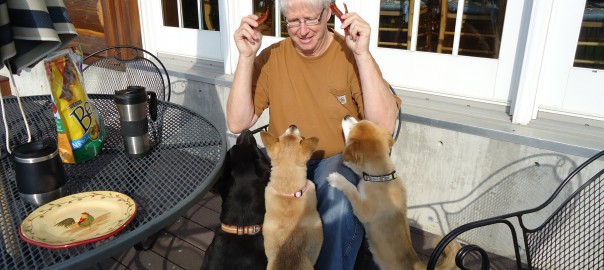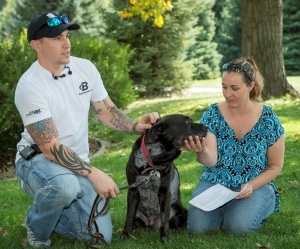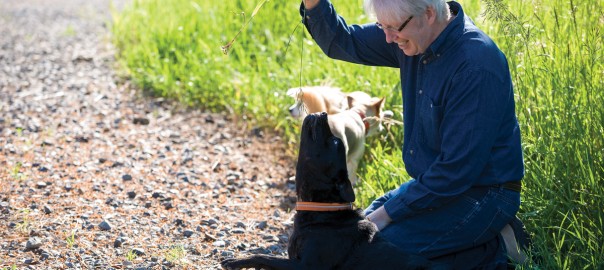My late Mother, Virginia, who birthed in me a great love of all animals (we lived on a small family farm) was proud of my professional accomplishments but over-the-top, boastfully proud, on only two occasions. Both happened in the late 1980s, once when she was sitting on the toilet reading Reader’s Digest and saw a feature article I’d written, and later when I spoke at the Smithsonian Institution.
At the Smithsonian, I debated a knitted-brow intellectual on whether or not dogs have emotions or whether we just anthropomorphize them.
The grey-haired guy in the tweed sport-coat went first, saying dogs were incapable of being depressed, making you feel guilty for leaving them, or falling in love with another animal.
He referenced books and studies and gave a passionate talk to a stone-faced audience. When it was my turn I started out by saying something like, “It’s obvious you don’t own a dog or you would know your argument is a bunch of BS. Everybody in this room who’s owned by a dog has experienced a pet being depressed, upset with you for not coming home early enough, or having fallen in love with another pet or special person.”
The crowd erupted in clapping and cheers in a way that still moves me over 30-years later.
I recently got an email from a drmartybecker.com reader who asked if pets can become severely depressed when another family pet passes. Yes! I’ve experienced this personally with multiple pets and witnessed this phenomenon literally hundreds of times being a practicing veterinarian.
Pets can also become dispirited when a human family member dies. In the early 1990s I was in New Zealand lecturing to veterinarians about the human-animal Bond when I was asked if I wanted to accompany a family member taking their dog, Sam, to the local mortuary to visit a family member who’d passed.
This Golden Retriever had been severely depressed, not eating or playing, not wanting to get out of bed even to go potty. I have to admit I’m creeped out a little by dead bodies, but what I witnessed that day gave new life to my understanding and appreciation of animal emotions and the Bond.
When the dog saw his best friend laying in the casket, he went wild! Surging on the leash, tail like a helicopter rotor, he jumped up and started licking the man’s face, knocking off his glasses in the process. The mortician rushed forward to the man’s glasses on, only to have the dog nudge them off with his nose. This was repeated one more time and then the spouse, speaking through happy tears explained, “Tom always sleeps with his glasses off.” And with that she tucked his glasses in the pocket of his suit coat and a calm came over the room.
Almost 25 years ago I found out it was not unusual in New Zealand for pet owners to take pets to see deceased family members, and I started mentioning and promoting this in lectures to veterinarians in my travels to dozens of countries. I also started recommending it to my own clients, friends, and family members, and I’ve been part of several of these special encounters. Time and time again I’ve seen pets who were crestfallen rise back up to normal.
As a veterinary student, Dr. Karen Sueda, a board certified veterinary behaviorist at the VCA West Los Angeles Animal Hospital, was a volunteer and ultimately the student coordinator for the UC Davis Pet Loss Support Hotline. She said it was very common for owners to comment that the other family pets would become depressed or withdrawn when a housemate passed away.
Sueda told me via email that, although we don’t know how a pet “feels” or what he or she is thinking, we can observe the pet’s behavior. If a pet seems to be listless or withdrawn; has a loss of interest in normal, pleasurable activities; loses his or her appetite; experiences agitation, anxiety or restlessness — clinical signs of depression in people — then it’s very possible the pet is experiencing what we would call “depression.”
Dogs, cats, birds, horses, etc. are social species that have evolved to care for, depend on, and bond with others. It’s not a stretch to think they would experience sadness or loss when that bond is broken.
Pets form special friendships or loves with other pets. My daughter Mikkel’s two Pugs, Willy and Bruce, will sleep right on top of each other even if inside a carrier big enough for a Great Dane. Our two canine cocktails, Quixote and Quora, play every day, ritualistically groom each other, and love to bark side-by-side when we have visitors. Dogs can also form close relationships with other species, including cats, bunnies, and horses; I’ve even seen them become friends with sheep, goats, and pigs.
When an animal dies or is ready for the final grace (euthanasia) here’s what I recommend:
- Strongly consider home euthanasia where the other pets can bear witness.
- Take the other pets to the veterinary hospital so they can be with their buddy when she draws her final breath and can come away with clues helping understand their friend has passed.
- Keep objects from the deceased animal around (at least in a transition period) for them to smell and be comforted by.
- Increase the animal’s activity.
- Don’t hesitate to contact your veterinarian to discuss your pet’s behavior. They will rule out physical reasons why your pet may be listless or not eating before attributing these to depression. Your vet may also be able to recommend behavior treatments and/or medication if your pet is truly depressed.
- Strongly consider getting a new pet, understanding that not all dogs match (and this is even more so with cats). The death of a pet can really shift the dynamicin a household where pets jockey for position. The good news is studies show pets in multiple pet households are healthier and live longer.
Forty years down the road, scientists and researchers have painted in the numbers of what we already knew to be true: Pets have emotions and we’re only beginning to know how to understand, celebrate, and protect them.




